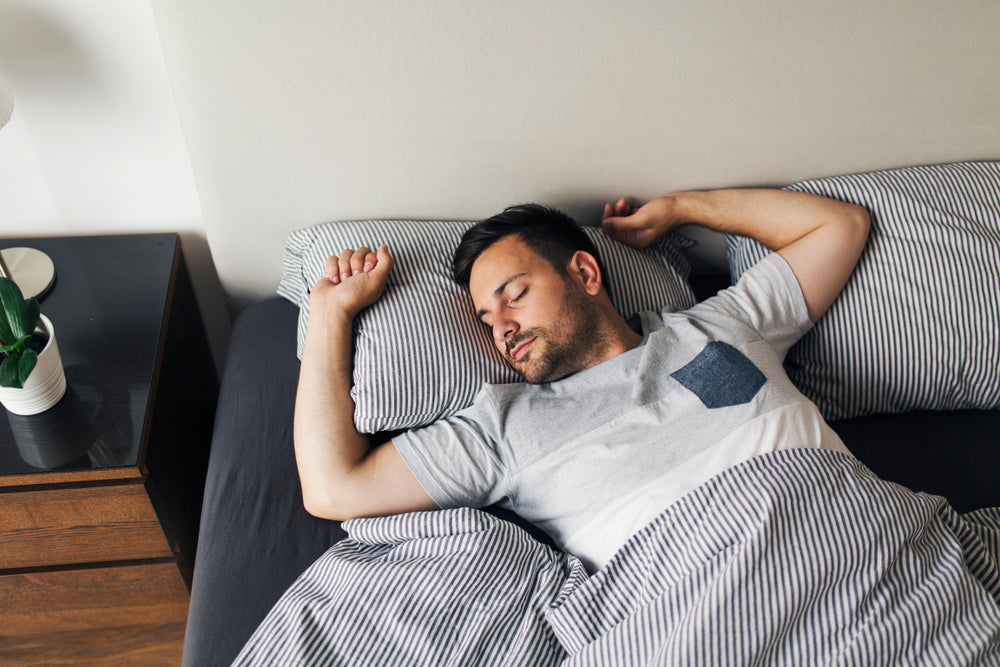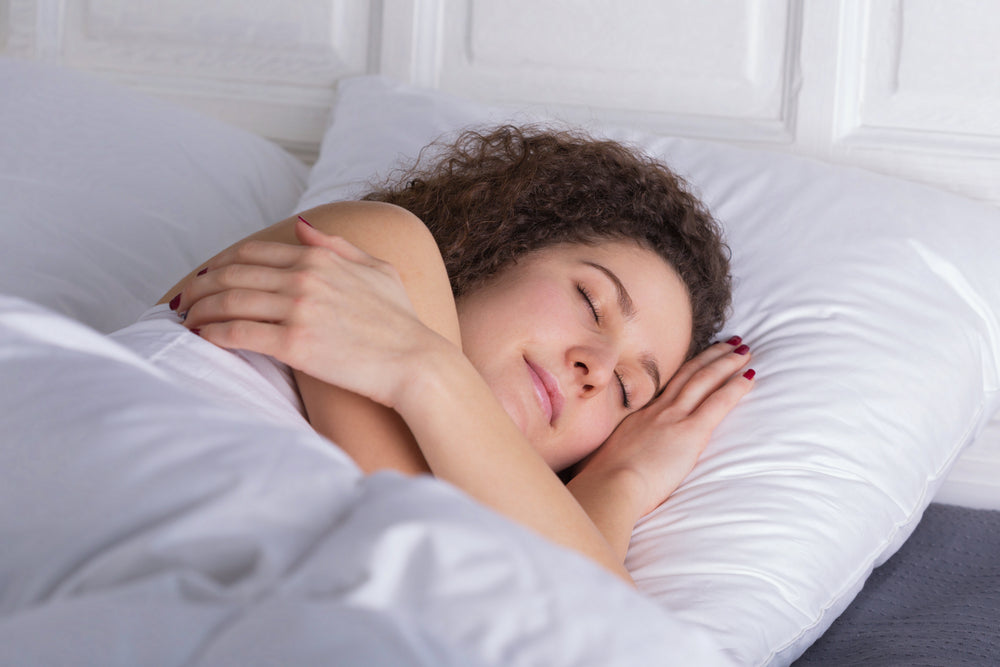Your Cart is Empty
Use the promo code BLACKFRIDAY to take advantage of the offer.
Use the promo code BLACKFRIDAY to take advantage of the offer.

Avoid the Back Sleeping Position to Prevent Acid Reflux
Burning in your throat, regurgitation, choking, coughing, heartburn all night long. The cause of this intense pain? Stomach acid.
Now before you go bad mouthing stomach acid to all your friends, understand that stomach acid isn’t the bad guy here. It plays a very important role in digestion and overall gut health. The problem isn’t the acid. The problem is that for those with acid reflux or gastroesophageal reflux disease (GERD), stomach acid escapes to where it does not belong, into the delicate lining of the esophagus and sometimes even up into your lungs, throat, and sinuses. Plain and simple, stomach acid isn’t meant to be outside your stomach. The key to controlling nighttime acid reflux symptoms is to keep stomach acid where it belongs – in your stomach. Gravity and anatomy play a huge role in finding relief from nocturnal GERD symptoms. During the day, you are most likely standing or sitting up so when stomach acid escapes, gravity and saliva quickly return this potentially harmful substance to the stomach. Also, when upright, your esophagus naturally flows down into your stomach. This quick return of acid to your stomach typically makes your symptoms shorter, as well as minimizes the potential damage acid can cause to the delicate lining of your esophagus and beyond.
Dangers of Nighttime Acid Reflux
You don’t have to sleep sitting up to take advantage of gravity and anatomy at night. You aren’t a giraffe after all. How you sleep can directly affect how often you feel symptoms, how bad those symptoms are, and how long the acid sits in your esophagus. The good news is that you can drastically change your nights by changing the way you sleep.

Back Sleeping: Avoid Whenever Possible
Back sleeping is the worst for those with acid reflux at night. When acid escapes from your stomach and you are sleeping flat on your back, it is able to flow freely into your esophagus and beyond…and stay there. Studies show that in this position, symptoms are often more frequent and tend to last longer 3 because the acid has nowhere to go. The severity of your symptoms may also increase if you have stomach fat, which pushes down on your stomach forcing contents to escape. Back sleeping should be the #1 position to avoid at night, if you suffer with nighttime acid reflux.
Right Side: It’s not Right for Acid Reflux
Position #2 to avoid at night is…sleeping flat on your right side. When lying flat on your right side, your stomach is actually above your esophagus creating a leaky faucet spouting stomach acid into the delicate lining of your esophagus. This is especially true when your stomach is full. Interestingly, when lying flat on your right side, your reflux symptoms tend to be more liquid in nature4 leading to regurgitation, coughing, and choking, which can be very scary in the middle of the night. Since gravity is doing nothing for you in this position, the amount of time acid lingers in your esophagus is much longer5 so stay off your right side.
So, back sleeping is bad. Right side sleeping is bad. What’s a GERD sufferer to do?
Left Side Reduces Reflux
Sleep on your left side. Gravity will work in your favor on your left side as your stomach is now positioned below your esophagus, which makes reflux more difficult. Should stomach acid escape, gravity is able to return it to your stomach quicker than when on your right side or on your back. Where the right side often produces liquid reflux, when on your left side, reflux symptoms tend to be more gaseous in nature 6, which may be annoying but much less distressing. Studies show that symptoms are less frequent and less severe when on your left side as compared to on your right side or on your back7 making it the most desirable flat sleep position.

Benefits of Propping Up Your Body
Has your doctor recommended that you sleep at an incline using a wedge pillow for heartburn or putting blocks under your bed frame? Studies show that sleeping at an incline decreases reflux symptoms and allows your body to get stomach acid back to your stomach quicker 8. As long as your entire torso is elevated (not just your head and neck), sleeping at an incline gives gravity a power boost to return stomach acid to your stomach and keep it there.
Incline + Left-Side Sleeping for Acid Reflux
So, what if you take the best flat sleeping position, aka the left side, and add an incline? Could the benefits be more than the sum of its parts?
Recent studies show that this is indeed the case 9,10. The compound inclined, left-side sleeping position on something like a wedge pillow makes acid reflux at night virtually impossible because your esophagus is now positioned well above the level of stomach contents, even if your stomach is full. And, if you do reflux, gravity is able to quickly return the contents to your stomach. Whew. This ideal sleep position provides a double whammy of decreasing your GERD symptoms and providing protection from prolonged acid exposure to your esophagus, throat, lungs, and sinuses. So, what’s the secret to controlling your acid reflux symptoms at night and finally getting good, quality sleep? Proper sleep positioning. Discover relief with the ideal position that maximizes the power of gravity and anatomy. Discover the MedCline Reflux Relief System, specifically designed to create and maintain the inclined, left-side position, clinically proven to be the most effective for natural relief from nighttime acid reflux or GERD.
References:
Fass, Ronnie. PPI bashing’ drives use of alternatives. gastoendnews.com, Sept. 2011.
Lagergren J, Bergstrom R, Lindgren A, Nyren O. Symptomatic GER as a risk factor for esophageal adenocarcinoma. N Engl J Med 1999; 340:825–831.
Khoury, Ramez M. Influence of spontaneous sleep positions on nighttime recumbent reflux in patients with Gastroesophageal Reflux Disease. The American Journal of Gastroenterology. Vol. 94, No. 8, 1999.
Shay SS, Conwell DL, Mehindru V, et al. The effect of posture on gastroesphageal reflux event frequency and composition during fasting. Am J Gastroenterology. 1996; 91: 54-60.
Khoury, Ramez M. Influence of spontaneous sleep positions on nighttime recumbent reflux in patients with Gastroesophageal Reflux Disease. The American Journal of Gastroenterology. Vol. 94, No. 8, 1999.
Shay SS, Conwell DL, Mehindru V, et al. The effect of posture on gastroesphageal reflux event frequency and composition during fasting. Am J Gastroenterology. 1996; 91: 54-60.
Khoury, Ramez M. Influence of spontaneous sleep positions on nighttime recumbent reflux in patients with Gastroesophageal Reflux Disease. The American Journal of Gastroenterology. Vol. 94, No. 8, 1999.
Stanciu C, Bennett JR: Effect of posture on gastro esophageal reflux, Digestion 1977, 15: 104-109
Person, E, Freeman, J, Rife, C, Clark, A, Castell, DO. A Novel Sleep Assist Device Prevents Gastroesophageal Reflux: A Randomized Controlled Trial. Journal of Clinical Gastroenterology. 2015 Sep; 49 (8): 655-9.
Allampati SK, Lopez R, Ray M, Birgisson S, Gabbard SL. Use of a Sleep Positioning Device Significantly Improves Nocturnal Gastroesophageal Reflux Symptoms, Diseases of the Esophagus, Volume 30, Issue 3, 1 March 2017, Pages 1–7,https://doi.org/10.1111/dote.12495.



